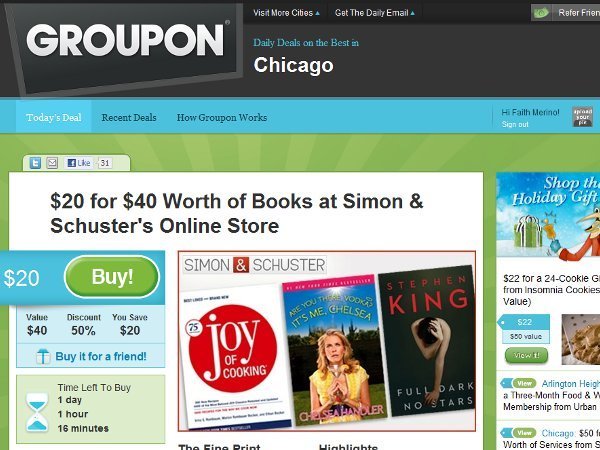
Both Google and Groupon have been keeping quiet on our report of an acquisition over Thanksgiving weekend, but until they come out and say definitively whether or not the deal has been cemented, the world is left to speculate. What would an acquisition by Google mean for Groupon? Is Groupon a passing fad—the Tamagotchi of the Web community? (Yep, I just dropped a Tamagotchi reference.)
There are a number of reasons why an acquisition would benefit both Google and Groupon. Firstly, there is the fact that Groupon is facing some pretty formidable competition from its own clones. In August, comScore reported that LivingSocial, a Groupon clone, now gets more unique monthly U.S. visitors to its site than Groupon.
Of course, that doesn’t mean that LivingSocial is seeing anywhere near the revenues that Groupon is raking in, but it does portend LivingSocial’s rising star in the social buying sphere. While there is some debate as to whether LivingSocial poses a real threat to Groupon, there is always the Lilliputian effect of hundreds of tiny Groupon spawn (180 in the U.S., alone) who, together, chip away at the Groupon market share. What better time to take shelter under the protective wing of Google? Groupon could leverage Google’s established Web presence to launch itself above the heel-nipping of its competitors, and this would, in turn, give Google a more local presence as well as a stronger grip on social. With Facebook’s recent unveiling of its new Deals feature, what better way for Google to engage in proper one-upmanship than to acquire Groupon?
“Facebook is building a very significant presence in this deal space, so Google [wants] to have a presence in the deal space as well,” said Lou Kerner, an analyst for Wedbush Securities, in an interview with the Chicago Tribune. “Increasingly, this fight between Google and Facebook is going to be about the social graph, the information about who people are connected to. … What deals you buy is a very valuable part of that social graph. Whoever acquires Groupon is going to have that as well.”
But what would a meshing of the two companies—a search engine leviathan and the cool new kid on the block—look like? What about Google’s reputation for being a hard-nosed, data-driven machine? Google has been suffering from serious brain drain recently as many of its top engineers have been leaving, citing an inability to get creative and take risks when Google’s data-based culture forces employees to justify their decisions with hard numbers. Groupon, by contrast, made a name for itself by spicing up its coupon write-ups with weird, edgy humor and making bizarre and slightly creepy videos, like the one below. How in the world are those two very different cultures going to blend?
Probably the same way that Google meshed with YouTube. While Google bought YouTube for $1.65 billion in 2006 (a sum that a lot of people thought was ridiculous), YouTube spent the next several years burning through cash like crazy with no profits to show for it. But Google happily (maybe) stepped aside to let YouTube do its own thing, which would likely be the case as well for Groupon. Groupon has built its success on its human element—working with local businesses, employing writers to infuse the site with totally unnecessary humor—so it’s highly doubtful that Google would want to disrupt that.
But ultimately, is it really in Groupon’s best interests? There’s no doubt that an acquisition of Groupon would benefit Google, but is now the right time for Groupon to sell? The company is white hot and has revenues through the roof. Groupon has consistently maintained that it has no plans to sell. With reported revenues of some $600 million a year, why would it? Because on its own, it’s a one-trick pony. With so many clones out there, how else is Groupon going to expand unless it merges with an established and diffuse Web presence that has already proven its ability to continuously transform and innovate.
And with that, I leave you with Monkey for a Week.
Monkey for a Week from Greg on Vimeo.
Image source: businessweek.com


















